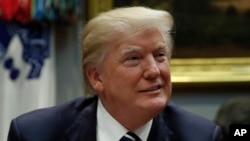President Donald Trump stunned lawmakers in a White House meeting on immigration Thursday when he reportedly referred to Haiti and African nations as “s---hole countries.”
“Why are we having all these people from s---hole countries come here,” the president asked as was first reported by media including The Washington Post, The New York Times and CNN. The crude term means dirty and impoverished.
Trump said the United States should let in more people from places such as Norway, whose prime minister met with him in the White House Wednesday.
White House response
After being asked by media, including VOA, to respond, White House spokesperson Raj Shah issued a statement saying the president will only accept an immigration deal that “adequately addresses the visa lottery system and chain migration — two programs that hurt our economy and allow terrorists into our country.” Chain migration is a term used by immigration critics to refer to the system that allows relatives to sponsor family members to come to the United States.
Shah’s statement did not deny reports that the president used crude language when talking about Haiti and Africa.
It also said Trump will always reject “temporary, weak and dangerous stopgap measures that ... undercut immigrants who seek a better life in the United States through a legal pathway.”
VOA also reached out to the offices of U.S. lawmakers who were reportedly present at the meeting. Aides to lawmakers who attended the meeting declined to provide comment on Trump’s remarks, according to the Associated Press.
Trump reportedly made the remark as Sen. Dick Durbin, a Democrat from Illinois, was explaining the outlines of an agreement reached by six bipartisan senators that would protect nearly 800,000 young immigrants from deportation as well as bolster border security, according to the Post.
Bipartisan comments
By late Thursday, lawmakers were reacting to the reported comments.
Minnesota state Rep. Ilhan Omar, who in 2016 became the first Somali-American elected to a state legislative office in the United States, released a statement, saying, “I am not ashamed of the country where I was born. I am not ashamed to call myself an American now. I am a proud immigrant, refugee, Minnesotan and a proud State Legislator.
“But make no mistake, I am ashamed, disturbed, and outraged that the leader of the United States can’t see beyond his own embarrassing privilege to embrace the diversity that has made this country great for generations,” added Omar, a member of the Democratic-Farmer-Labor Party.
Republican Rep. Mia Love, whose family came from Haiti, said the president’s comments are “unkind, divisive, elitist, and fly in the face of our nation’s values. This behavior is unacceptable from the leader of our nation.”
Love, of Utah, called on Trump to apologize to the people of Haiti.
Utah Sen. Orrin Hatch, also a Republican, said he wanted more details “regarding the president’s comments.”
“Part of what makes America so special is that we welcome the best and brightest in the world, regardless of their country of origin,” Hatch added.
Arizona Sen. Jeff Flake, a Republican, tweeted late Thursday, “My ancestors came from countries not nearly as prosperous as the one we live in today. I’m glad that they were welcomed here.”
Republican Rep. Ileana Ros-Lehtinen of Florida tweeted Trump’s “calling #Haiti a ‘shithole country’ ignores the contributions thousands of Haitians have made to our #SoFla community and nation. Language like that shouldn’t be heard in locker rooms and it shouldn’t be heard in the White House.”
California Sen. Kamala Harris, a Democrat, said in a tweet, “Immigrants from countries across the globe — including and especially those from Haiti and all parts of Africa — have helped build this country. They should be welcomed and celebrated, not demeaned and insulted.’’
Rep. Cedric Richmond of Louisiana, chairman of the Congressional Black Caucus, said, “President Trump’s comments are yet another confirmation of his racially insensitive and ignorant views. It also reinforces the concerns that we hear every day, that the President’s slogan Make America Great Again is really code for Make America White Again.”
New Mexico Rep. Michelle Lujan Gisham, chair of the Congressional Hispanic Caucus, responded in a statement, “The President’s statement is shameful, abhorrent, unpresidential, and deserves our strongest condemnation. We must use our voices to ensure that our nation never returns to the days when ignorance, prejudice, and racism dictated our decision making.
“Our nation’s strength and the American Dream stem from our immigrant roots and diversity,” she added.
Brian Concannon, executive director of the Boston-based Institute for Justice and Democracy in Haiti, told VOA he is “outraged” at what he regards as an insult to the Haitian people. He said Trump’s apparent description of Haiti as a “s---hole” is “not an accurate description of Haiti.”
The NCAAP said in a statement, “The United States’ position as a moral leader throughout the world has been thoroughly damaged by the continuous lowbrow, callous and unfiltered racism repeatedly espoused by President Trump. His decision to use profanity to describe African, Central American and Caribbean countries is not only a low mark for this president, it is a low point for our nation.’’
The White House statement released Thursday:
“Certain Washington politicians choose to fight for foreign countries, but President Trump will always fight for the American people. The President will only accept an immigration deal that adequately addresses the visa lottery system and chain migrationtwo programs that hurt our economy and allow terrorists into our country. Like other nations that have merit-based immigration, President Trump is fighting for permanent solutions that make our country stronger by welcoming those who can contribute to our society, grow our economy and assimilate into our great nation. He will always reject temporary, weak and dangerous stopgap measures that threaten the lives of hardworking Americans, and undercut immigrants who seek a better life in the United States through a legal pathway.”
VOA correspondents Steve Herman and Michael Bowman contributed to this report.




